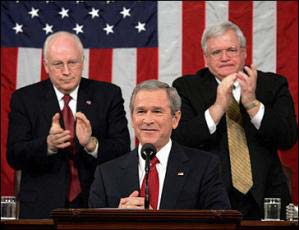 David Dunn of the University of Birmingham writes for EA:
David Dunn of the University of Birmingham writes for EA:
Part of the sense of occasion that surrounds the 10th anniversary of the 9/11 attacks, in the US in particular, is nostalgia for the world that existed before the events of that day. In 2001 America seemed invulnerable, in control of its own destiny and more dominant of the international system that it had created than at any time in the post war period. That situation was one of the victims of the terrorist attacks.
America’s vulnerability stemmed from a failure to imagine attacks like the ones that occurred. The post-9/11 result was a willingness to imagine all too many threats and possibilities as Washington looked at the world anew. The terrorist attacks were an attempt to decapitate the political and financial elites of the US and this led Washington to conceive of them as an act of war.
See also Reflecting on 9-11: Why It Was Not a Turning Point for the World
To avoid identifying that war as being against Islam in any form, the conflict was linguistically constructed as the “War on Terror”. Doing so, however, the US allowed itself to be drawn into conflict with any and all terrorist threats, real and imagined. While the intervention in Afghanistan in 2001 was largely seen as justified, the Bush administration’s process of threat inflation and conflation led it to target Saddam Hussein’s Iraq in 2003 in a war that was disastrous for America’s international reputation, the geopolitics of the Middle East, and its fight against Al Qa'eda in Afghanistan.
The near decade of war that followed the attacks has also been destructive of America’s geopolitical position. The two wars have cost the US more than $3 trillion and have been fought, unlike all previous wars, while simultaneously cutting taxes. The result, together with the 2008 financial crisis, is that the US is $14 trillion in debt, is in a deep recession, and is too politically divided to agree a pathway out of this crisis.
Geopolitically, while the US has focused on the Middle East, the international system has been dominated over the last decade by the rise of new emerging powers, most notably China, but also by India, Brazil, Russia and others. America’s distraction has allowed Beijing to develop massive strategic interests in Africa and Latin America, and to build an ocean-going navy which is the source of new concerns in Asia as it asserts its influence in the South China seas and elsewhere.
The rise of these developing economies signals a massive shift of wealth and influence from the West, and yet the focus on the war on terrorism has largely meant that this has gone without notice or remedial attention. Even in the Middle East, America’s position has weakened, with Iran being the geopolitical benefactor of the invasion of Iraq, and the Arab Spring sweeping away Washington’s old allies and certainties in a process of transition, the conclusion of which is at present uncertain.
Perhaps the most significant casualty of the war on terrorism, however, has been the decade that has been lost in dealing with global climate change. Because of its urgency and horror, the threat presented by terrorism has dominated many aspects of the security debate over the last ten years, but it has done so at the expense of dealing in any serious way with global warming which presents a far greater, more destructive and more certain threat to life on earth than al Qaeda or its associates.